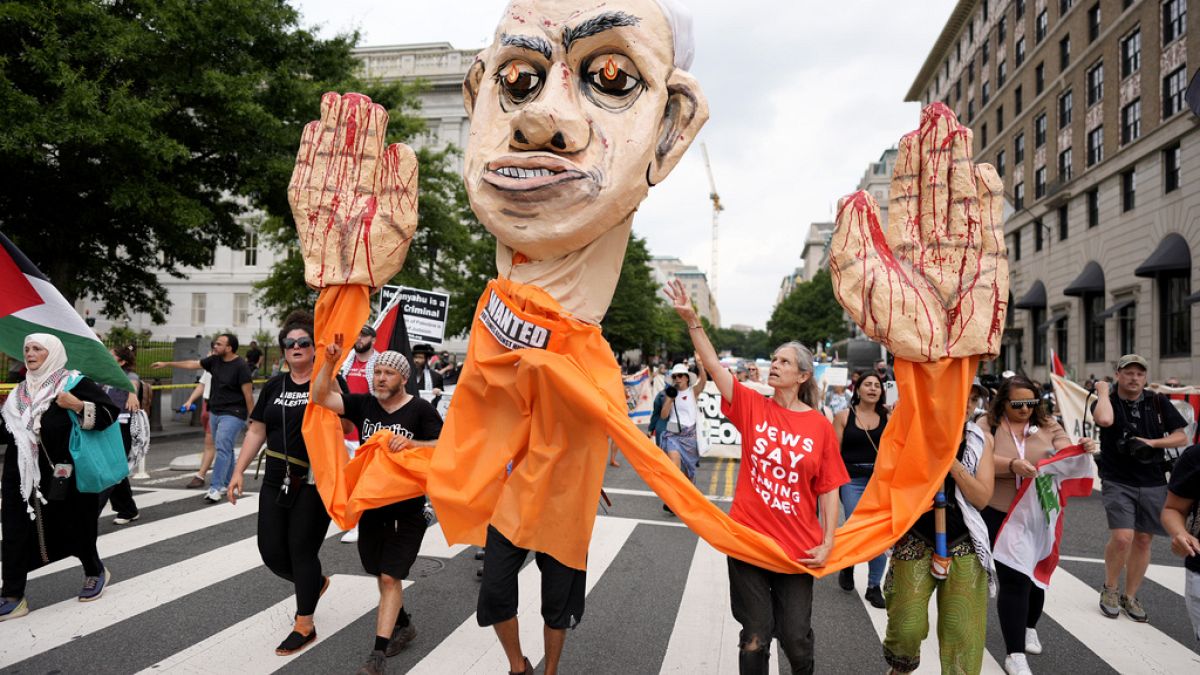Russia’s war in Ukraine has turned out to be a powerful anti-corruption initiative — at least at the Ministry of Defense.
Washington
In Putin’s wartime Russia, military corruption is suddenly taboo

Last month, President Vladimir Putin reassigned his longtime defense minister, Sergei Shoigu, to be head of Russia’s national security council. In Shoigu’s place, Putin appointed a former economy minister, Andrei Belousov, with a mandate to use the country’s growing defense budget “sparingly yet effectively.”
More dramatically, however, five top officials including a deputy defense minister have been arrested since April as the Kremlin sends a sharp message that neither excess nor disloyalty will be tolerated in wartime.
GET CAUGHT UP
Summarized stories to quickly stay informed
The most senior official to be arrested, Deputy Defense Minister Timur Ivanov, led an ostentatious lifestyle — typical of Russia’s elite but impossible on a public salary.
Ivanov’s taste for Western luxury clashed with Putin’s drive to forge a new ideology based on traditional values and in opposition to liberal, Western permissiveness.
Ivanov, head of military construction group Oboronstroi from 2013 until 2016 and then deputy minister of defense, has been accused of taking especially large bribes and of fraud. He led rebuilding projects in Mariupol, an occupied Ukrainian city left in ruins by Russia’s intensive bombardments.
Ivanov has partied with Kremlin spokesman Dmitry Peskov and other elite Russians, built luxury homes stuffed with rare antiques, and enjoyed annual summer vacations in St. Tropez with his family, where he allegedly spent nearly $1.4 million from 2013 to 2018 on luxury villas, yachts and a Rolls-Royce — details that were revealed in reports by the Anti-Corruption Foundation founded by the late Russian opposition leader Alexei Navalny.
Along with vast increases in military and security spending, which will rise to 8.7 percent of total economic output this year, Putin has demanded greater efficiency. The Federal Security Service or FSB, and the Investigative Committee, a top national law enforcement body, have established a special investigation force to root out military corruption — and more arrests are likely, according to Kommersant, a Russian newspaper.
Although Putin lately has emphasized his anti-corruption drive, analysts see no fundamental shift in his regime’s kleptocratic tendencies, including the Kremlin’s patronage for a coterie of loyal oligarchs and security officials.
“Everyone — everyone — must work as if we are on the front line,” he said, demanding a new sense of mobilization and urgency from top officials in the Council for Strategic Development and National Projects and commissions of the State Council on May 29.
“Everyone must act as mobilized personnel, and this is the only way for us to achieve the goals we set for ourselves,” he said, adding: “We are all aware of the fact that the main objectives of the country’s future are largely addressed on the front line.”
On Feb. 19, Putin ordered the FSB to probe corruption in defense procurement and state projects. In April. he exhorted a board of the Interior Ministry to step up the fight against corruption, which he said was “poisoning our society” and “stealing the money we need for the defense of the country.”
High-level corruption was intrinsic to Russia and was used as a means of political control, said Kirill Shamiev, a military analyst with the European Council on Foreign Relations, who wrote a report analyzing failures in repeated efforts to reform Russia’s military. “When someone needs to be removed, they can almost always use corruption and say this person has committed an offense and needs to be put in jail,” Shamiev said.
Navalny’s Anti-Corruption Foundation obtained six years of emails of Ivanov’s second wife, Svetlana Maniovich, including embarrassing videos and images of elite champagne-soaked parties and vacations, as well as invoices for payments for jewelry, horse livery, furniture, designer outfits and yacht rentals.
Several months after Russia’s February 2022 invasion of Ukraine, Ivanov divorced Maniovich and was quickly attached to Maria Kitaeva, who had three children with another deputy defense minister. Both women are glamorous former TV hosts, who posted frequently on Instagram, displaying their expensive tastes.
Ivanov’s lawyer told a Russian court that the former defense minister set up a household with Kitaeva and she gave birth to a child — his fifth — in January.
According to the Anti-Corruption Foundation’s account of Maniovich’s emails, she held a birthday party in 2019 in Moscow’s elite Rublyovka district, where Peskov made a toast, wearing a Richard Mille watch on his wrist. Ivanov hurried over and covered the watch with Peskov’s sleeve, according to a video, which was viewed more than 9 million times.
Peskov did not respond to questions from The Washington Post about the incident and anti-corruption drive.
The foundation reported that Olimpsitistroi, a big construction contractor hired by the Ministry of Defense to rebuild parts of Mariupol, offered kickbacks to Ivanov: luxury materials to build a country mansion near Tver and other properties.
The case against Ivanov is based on the Tver bribes, according to Russian media. Ivanov’s lawyer told Russian media that “films” led to Ivanov’s arrest, an apparent allusion to the foundation’s reports. Two businessmen, including Alexander Fomin, co-founder of Olimpsitistroi, were also arrested, as were other military officials in unrelated cases.
Lt. Gen. Yuri Kuznetsov was charged with taking especially large bribes — a house and land — from a businessman, in return for military contracts. Investigators reported finding gold coins, a collection of watches and other luxury items in his home.
Lt. Gen. Vadim Shamarin, head of military communications, was charged with taking especially large bribes from a telecom company in exchange for state contracts. Another Defense Ministry official, Vladimir Verteletsky, head of the department in charge of defense orders, was arrested for abuse of office.
Also arrested and charged with large-scale fraud was the ex-commander of the 58th Army, Maj. Gen. Ivan Popov, who was fired last year after criticizing Russia’s military command in the wake of last year’s rebellion by mercenary leader Yevgeniy Prigozhin.
Investigators found no cash or luxury items in Popov’s home, Russian media reported, leading many to conclude that Popov was targeted for disloyalty. He is accused of stealing more than 1,700 tons of metal purchased for defensive structures on the front line.
The reassignment of Shoigu to another top position highlighted the premium Putin places on loyalty. Shamiev, the analyst, said the recent arrests were intended to instill fear and respect after Belousov’s appointment as defense minister.
“It also gives a message to the Russian public that all the failures in the war are because of the military, nothing else, especially not Putin himself,” he said.
Dimitri Minic, an expert on Russia’s military at the French Institute of International Relations, said the arrests were part of an effort to maximize military resources. But Minic said that corruption was used as a pretext to remove incompetent officials or to settle political scores. Often, it signaled infighting between agencies, he said.
A buildup of grievances over the handling of the war “open the way for all-out settling of scores conducted with the Kremlin’s acquiescence, against the backdrop of an influx of resources into the Ministry of Defense and infighting for their control and capture,” he said.
Other top generals with property that seems to far exceed what they could afford on their official incomes were investigated by the Anti-Corruption Foundation and have not been charged.
Peskov, the Kremlin spokesman, denied any purge or anti-corruption campaign in comments at a daily conference call with journalists. “The fight against corruption is a consistent effort,” he said. “This isn’t a campaign. It’s constant, ongoing work.”

Washington
Trump ally who denies 2020 election results threatens law enforcement

The “Cyber Crisis: Saving Tina Peters” event was aimed at rallying support for the former clerk of Mesa County, Colo., who faces charges accusing her of tampering with election equipment three years ago. Peters has pleaded not guilty, and her case goes to trial next week.
Byrne called out law enforcement and prosecutors during the forum, saying they would face violence if they did not drop the case.
“If you have any brains at all, which I’m not sure they do, they should be throwing in the towel and just surrendering and dropping this case against Tina because those who don’t are going to end up facing a piano wire and a blowtorch before this is over if I have anything to do with it,” Byrne said. “So I know that’s probably another felony, but f— it — threatening them like that — but there we are.”
Byrne, who said he was participating in the event from Azerbaijan, accused law enforcement of committing treason and claimed he had been hacking Venezuela’s government for two years.
“I don’t care how many felonies I’ve committed, and I don’t care that I’m committing felonies by threatening you,” he said of law enforcement. “You folks do your job or when this is over, the folks who are part of this are going to be facing, you know, piano wire and blowtorches before this is over. So you start doing your job and stop worrying about me.”
Byrne said Friday that his comments were “obviously a metaphor.”
“Please be aware that my turns of phrase like that are metaphoric expressions,” he said by text message. “There’s been no one more committed to peaceful resolution of this than I.”
He said his views on peace do not extend to people like former ambassador Manuel Rocha, who pleaded guilty this year to serving as a secret agent for Cuba for decades. “The only exception to peaceful resolution will be for any who turn out of Cuba and Venezuela, such as ambassador Rocha,” Byrne said by text message.
Byrne noted it was 4 a.m. in Azerbaijan when he participated in the event on X, and he may not have spoken as carefully as he otherwise would.
Spokespeople for the Colorado attorney general’s office and Mesa County district attorney’s office did not immediately comment Friday.
Byrne’s comments come three-and-a-half months ahead of the presidential election, as scholars, law enforcement agencies and election administrators raise alarms about the risk of political violence. Election officials have faced an onslaught of threats and harassment since the 2020 election and the Jan. 6, 2021, attack on the U.S. Capitol by a mob chanting about Donald Trump’s false election claims.
Two weeks ago, Trump was injured during an assassination attempt that left one of his supporters dead at a rally in Butler, Pa. The violence fueled new warnings of the risk to public officials and ordinary Americans, regardless of their political views.
Before today’s combustible political environment, the phrases Byrne used might have prompted outreach by authorities to advise against using such language, said Paul Charlton, a former U.S. attorney under President George W. Bush. These days, state and federal officials tend to take such talk more seriously. Byrne’s language, he said, “sounds not only like a threat but a confession and an acknowledgment that it could be a felony to make such a threat.”
Words alone can be sufficient to prosecute threats against public officials if authorities can show proof of intent to do harm, he said.
“That is an instance in which, in my mind, it is very much worth law enforcement’s attention,” Charlton said.
Byrne’s repeated references to the Peters trial — and the prosecutors involved in it — are important aspects of his overall comments, said Carol Lam, a former U.S. attorney for the Southern District of California who was also appointed by Bush.
“Because he references a specific trial and he’s talking about the people who are bringing the case, that should be very troubling to law enforcement,” she said. Even if he said he was speaking metaphorically, she added, “What does that matter if someone went out and bought piano wire at his suggestion?”
Two hours after The Washington Post contacted Byrne, he posted a statement on X that reiterated what he told a reporter about meaning his comments metaphorically. He said he wanted people to remain peaceful, but added information would come out that would “test our ability to remain peaceful and my ability to contribute to that cause.”
Byrne used this week’s online forum to argue for dropping the charges against Peters, who is accused of participating in a scheme to allow a purported data expert to secretly copy files from Dominion Voting Systems equipment in 2021. She faces seven felonies and three misdemeanors in a case that is scheduled to go to trial on Wednesday.
He has long championed Peters and others who have questioned the results of the 2020 election. Four days after members of the electoral college voted to give Biden a victory in December 2020, Byrne joined other Trump allies in the Oval Office to argue Trump could use the National Guard to seize voting machines. Also in the meeting were Trump-aligned attorneys Sidney Powell and Rudy Giuliani and former national security adviser Michael Flynn.
In the years since, Byrne has used his fortune and his nonprofit America Project to bankroll efforts meant to uncover problems with how elections are run, including a partisan review of the 2020 election in Arizona. Byrne and the America Project have helped fund groups like We the People Ariz. Alliance, an Arizona-based political action committee whose co-founder in March said she would “lynch” a Republican official who helps oversee elections in the state’s largest county. She later said her comment was a joke.
Courts and independent agencies have found no evidence of widespread election fraud.
Byrne led Overstock for two decades. He resigned in 2019 after it came to light that he had been romantically involved with Maria Butina, a Russian gun activist who pleaded guilty in 2018 to conspiring with a Russian official to infiltrate conservative politics in the United States. She was deported after serving a 15-month prison sentence. Byrne published a memoir this year that included a preface by Butina.
Dominion, the voting machine company, filed a $1.6 billion defamation lawsuit against Byrne in 2021. The case is ongoing. Dominion won settlements of $787.5 million with Fox News and $243 million with Newsmax and is seeking $1 billion or more from Giuliani, Powell and MyPillow CEO Mike Lindell.
Spencer S. Hsu and Rachel Weiner contributed to this report.
Washington
Video. Protesters rally in Washington during Biden's meeting with Netanyahu

Updated:
Gaza war protesters took to the streets outside of the White House in Washington DC, where President Joe Biden met with Israeli Prime Minister Benjamin Netanyahu on Thursday.
Gaza war protesters took to the streets outside of the White House in Washington DC, where President Joe Biden met with Israeli Prime Minister Benjamin Netanyahu on Thursday.
Chanting “Arrest Netanyahu,” the protestors brought in an effigy of the Israeli leader wearing an orange jumpsuit with blood on its hands.
A label on the jumpsuit read: “Wanted for crimes against humanity.”
Protesters poured red liquid from jugs onto the street across from nearby Lafayette Park. A speaker said it “symbolised the blood of the Palestinians.” Holding up blood smeared hands, they yelled: “Shame!” and chanted: “You are stealing Gaza’s blood!”
A small number of counter-protesters wore Israeli flags around their shoulders.
Washington
Barack and Michelle Obama endorse Kamala Harris for president

“We called to say Michelle and I couldn’t be prouder to endorse you and to do everything we can to get you through this election and into the Oval Office,” the former president says to Harris.
Michelle Obama adds, “I can’t have this phone call without saying to my girl Kamala: I am proud of you. This is going to be historic.”
In a separate statement, the Obamas pledged to “do everything we can” to elect Harris and called on their legions of supporters to join the effort.
They praised Harris’s record of accomplishments, listing each of her previous roles in what could be interpreted as a rejoinder to Republicans who have labeled her a “DEI hire” — a reference to “diversity, equity and inclusion” initiatives often used derisively to suggest that Harris only reached the upper echelon of American politics because of her race and gender.
“But Kamala has more than a résumé. She has the vision, the character, and the strength that this critical moment demands,” they wrote. “There is no doubt in our mind that Kamala Harris has exactly what it takes to win this election and deliver for the American people. At a time when the stakes have never been higher, she gives us all reason to hope.”
Their call with Harris took place on Wednesday. Barack Obama said the Democrats would be “underdogs” but pledged to work hard for her election.
“Bottom line is, we are ready to get to work,” he said during the call, according to a transcript. “We are telling everybody to kick off those bedroom slippers and get off the couch and start knocking on doors and making phone calls.”
Many Republicans seized on the fact that Obama did not mention or endorse Harris in his initial statement responding to Biden’s abrupt exit from the race Sunday.
“We will be navigating uncharted waters in the days ahead,” he said in that statement. “But I have extraordinary confidence that the leaders of our party will be able to create a process from which an outstanding nominee emerges.”
On Thursday, Donald Trump’s campaign seized on Obama’s lack of an endorsement to make the case that Harris’s path to the nomination was not a done deal. Steven Cheung, a campaign spokesman, said Trump would not agree to debate Harris until she was officially the Democratic nominee, suggesting without evidence that Obama and other top Democrats were considering backing a different candidate.
“There is a strong sense by many in the Democrat Party — namely Barack Hussein Obama — that Kamala Harris is a Marxist fraud who cannot beat President Trump, and they are still holding out for someone ‘better,’” Cheung said in a statement Thursday evening. “Therefore, it would be inappropriate to schedule things with Harris because Democrats very well could still change their minds.”
The Obamas’ endorsement comes after Harris already secured enough pledges from delegates to become the likely nominee. Biden exited the race on Sunday and immediately endorsed Harris, who quickly coalesced much of the Democratic Party behind her bid.
Just before Biden dropped out of the race, Obama told allies that the president’s path to victory had greatly diminished and he thought the president needed to seriously consider the viability of his candidacy, according to multiple people briefed on his thinking, who spoke on the condition of anonymity to discuss confidential conversations. In those conversations, Obama emphasized he felt protective over Biden as a friend and was concerned about his legacy.
-

 World1 week ago
World1 week agoOne dead after car crashes into restaurant in Paris
-

 Midwest1 week ago
Midwest1 week agoMichigan rep posts video response to Stephen Colbert's joke about his RNC speech: 'Touché'
-

 News1 week ago
News1 week agoVideo: Young Republicans on Why Their Party Isn’t Reaching Gen Z (And What They Can Do About It)
-

 News1 week ago
News1 week agoIn Milwaukee, Black Voters Struggle to Find a Home With Either Party
-

 Politics1 week ago
Politics1 week agoFox News Politics: The Call is Coming from Inside the House
-

 Movie Reviews1 week ago
Movie Reviews1 week agoMovie Review: A new generation drives into the storm in rousing ‘Twisters’
-

 News1 week ago
News1 week agoVideo: J.D. Vance Accepts Vice-Presidential Nomination
-

 World1 week ago
World1 week agoTrump to take RNC stage for first speech since assassination attempt















